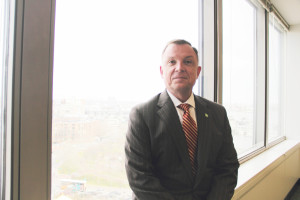Mark C. Crandall
Title: Regional President, Southern New England, TD Bank
Age: 57
Experience: 35 years
Mark Crandall has a classic banking success story. He got into the business as a teller at a bank in Wellesley and went on to hold a number of retail and branch banking roles before he moved into small business banking. In his current role at TD Bank, he oversees 225 stores across Massachusetts, Connecticut and Rhode Island. Crandall recently sat down with Banker & Tradesman to talk about what TD’s been up to, the bank’s diversity initiatives and what it means to be a good manager.
Q: You mentioned that early in your career, you were not the best manager you could be. What did you learn from that experience and what might you say to somebody who’s just beginning their banking career?
A: I have this conversation a lot with people. I do a lot of mentoring in this role and it is a big part of the fabric of our culture, this mentoring and developing people, so I take that very seriously.
People will say, “I want to be a manager,” so the questions I ask people when they say that: “Why do you want to be a manager? What is it about management that appeals to you?” And oftentimes it’s sort of notoriety, “I’m a manager and so I feel good about myself,” it’s salary, and those are all the wrong answers as to why you want to be a manager.
What I do tell people is, managing is not for everybody. It’s messy. You never know what your day is going to look like when you start because you are there as a resource for everybody that you manage. It’s not the other way around. So you have to want to be there for the good of the people that you work with. You have to want to help them with their careers. You have to want to listen to their problems, to whatever it is that they want to think about and talk about. Those are the important things around management. If you really don’t care about developing people and making sure that people’s work lives are productive and they’re successful, then being a manager just so you can get paid well and have a nice business card is a horrible mistake.
Q: Can you give us a rundown of some of your highlights from the past year?
A: We’ve had terrific success in attracting new commercial banking customers. We’ve booked more new loans last year than we ever have in any year prior. Retail banking was a remarkable success for us in terms of deposit growth, customer growth. I think we did a much better job of really having good conversations with our customers in the stores around other products and services besides a checking account and a debit card, including the use of technology and digital channels and all of the things we have to offer to make banking easier and more convenient.
With small business, we have been very successful in terms of getting out to the market. We won the JD Power award for small business banking in New England, which is absolutely huge for us, so that remains a key area of focus for us and it always will quite frankly.
Honestly if there’s one thing I’m most proud of [it’s that] … they all work really well together. The people in the stores know all the commercial people and all the small business people, so they work and play together and really approach our customers as TD Bank, not as the commercial group or the corporate group or the wealth team or the treasury management team or the retail group. Everybody here is really in it all together.
Q: You’ve talked about driving deposit growth on the retail side, but also about investing in your people. How are those two related?
A: We try to have people in our stores and in our business that reflect the nature of the market, whether that’s by ethnicity or any other way you measure it. I think we really do a good job of reaching out. If it’s a highly Hispanic population, then we want people from that population in our business helping us run it. That’s a big deal. And we are very involved in the community, as much or more than any other bank in the market. You see us out planting trees, we’re the only bank that has a float in the pride parade, and we have people in droves out there.
We’re really proud of our diversity initiatives, but more than that, it really helps us reflect what the market looks like. Not everybody is a middle-aged white guy in a jacket and tie. That’s not what it looks like. That happens to be what I look like, but that’s not what everyone else looks like.
We really get out to the community and really touch our neighborhoods. Honestly, that and just having awesome people. … It’s really a remarkable franchise that we have built here and that’s what drives our deposits. It’s not the best rates on the street. It’s not the commodity business, but that’s how you differentiate yourself.
For Crandall’s thoughts on what it means to be a mentor and more advice for new managers, check out his video interview.
Crandall’s Top Five New England Destinations:
- Anywhere his kids are.
- Outer Cape Beaches – the surf, the sand, the dunes. It is something really special.
- White Mountains – hiking, skiing, exploring, even just driving.
- Maine/New Hampshire coast – the seafood shacks, the beaches, charming New England Inns.
- Boston’s North End – the food, the wine, the people watching, the warm neighborhood atmosphere.








